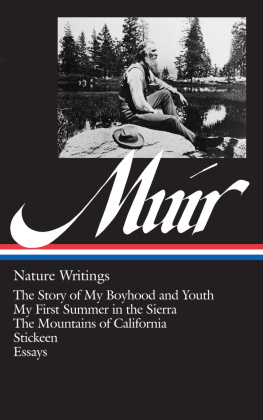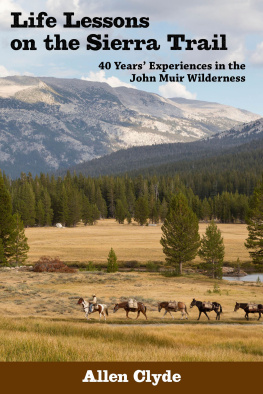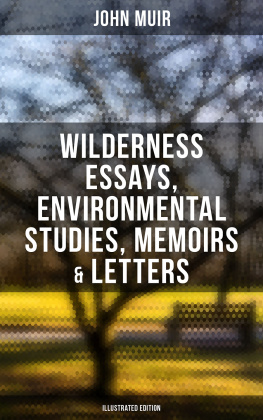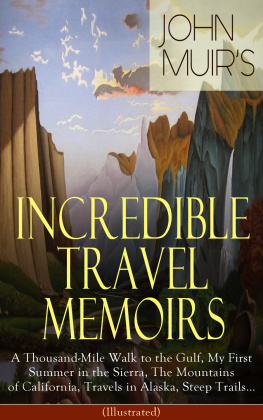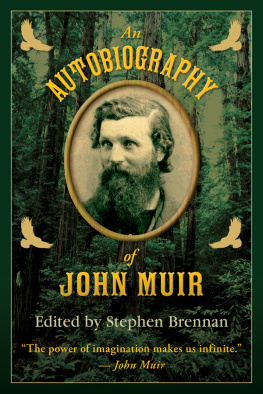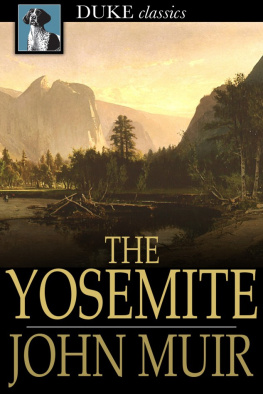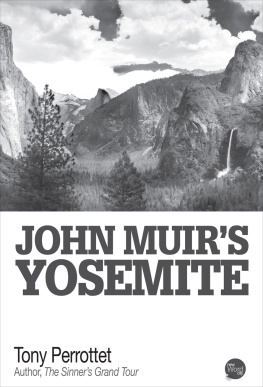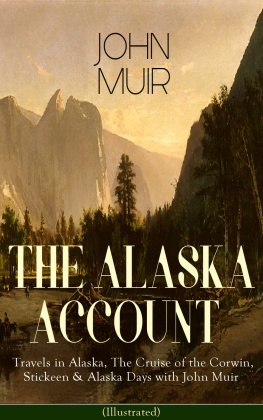Cronon William - John Muir
Here you can read online Cronon William - John Muir full text of the book (entire story) in english for free. Download pdf and epub, get meaning, cover and reviews about this ebook. year: 2014;1997, publisher: Library of America, genre: Non-fiction. Description of the work, (preface) as well as reviews are available. Best literature library LitArk.com created for fans of good reading and offers a wide selection of genres:
Romance novel
Science fiction
Adventure
Detective
Science
History
Home and family
Prose
Art
Politics
Computer
Non-fiction
Religion
Business
Children
Humor
Choose a favorite category and find really read worthwhile books. Enjoy immersion in the world of imagination, feel the emotions of the characters or learn something new for yourself, make an fascinating discovery.
- Book:John Muir
- Author:
- Publisher:Library of America
- Genre:
- Year:2014;1997
- Rating:5 / 5
- Favourites:Add to favourites
- Your mark:
- 100
- 1
- 2
- 3
- 4
- 5
John Muir: summary, description and annotation
We offer to read an annotation, description, summary or preface (depends on what the author of the book "John Muir" wrote himself). If you haven't found the necessary information about the book — write in the comments, we will try to find it.
John Muir — read online for free the complete book (whole text) full work
Below is the text of the book, divided by pages. System saving the place of the last page read, allows you to conveniently read the book "John Muir" online for free, without having to search again every time where you left off. Put a bookmark, and you can go to the page where you finished reading at any time.
Font size:
Interval:
Bookmark:


The Story of My Boyhood and Youth
My First Summer in the Sierra
The Mountains of California
Stickeen
Selected Essays


THE LIBRARY OF AMERICA
THE LIBRARY OF AMERICA, a nonprofit publisher, is dedicated to publishing, and keeping in print, authoritative editions of America's best and most significant writing. Each year the Library adds new volumes to its collection of essential works by America's foremost novelists, poets, essayists, journalists, and statesmen.
If you would like to request a free catalog and find out more about The Library of America, please visit with your name and address. Include your e-mail address if you would like to receive our occasional newsletter with items of interest to readers of classic American literature and exclusive interviews with Library of America authors and editors (we will never share your e-mail address).
Volume compilation, notes, and chronology copyright 1997 by Literary Classics of the United States, Inc., New York, N.Y.
All rights reserved.
No part of this book may be reproduced commercially by offset-lithographic or equivalent copying devices without the permission of the publisher.
Library of Congress Catalog Card Number: 969664
For cataloging information, see end of Index.
ISBN 9781883011246 (Print)
ISBN 1883011248 (Print)
ISBN 9781598533422 (ePub)
The Library of America92
WILLIAM CRONON
SELECTED THE CONTENTS AND WROTE THE NOTES FOR THIS VOLUME
John Muirs Nature Writings
is kept in print by a gift in memory of
MARGARET T. MORRIS
(19051980)
from the
Margaret T. Morris Foundation
to the Guardians of American Letters Fund, established by The Library of America to ensure that every volume in the series will be permanently available.
W HEN I was a boy in Scotland I was fond of everything that was wild, and all my life Ive been growing fonder and fonder of wild places and wild creatures. Fortunately around my native town of Dunbar, by the stormy North Sea, there was no lack of wildness, though most of the land lay in smooth cultivation. With red-blooded playmates, wild as myself, I loved to wander in the fields to hear the birds sing, and along the seashore to gaze and wonder at the shells and seaweeds, eels and crabs in the pools among the rocks when the tide was low; and best of all to watch the waves in awful storms thundering on the black headlands and craggy ruins of the old Dunbar Castle when the sea and the sky, the waves and the clouds, were mingled together as one. We never thought of playing truant, but after I was five or six years old I ran away to the seashore or the fields almost every Saturday, and every day in the school vacations except Sundays, though solemnly warned that I must play at home in the garden and back yard, lest I should learn to think bad thoughts and say bad words. All in vain. In spite of the sure sore punishments that followed like shadows, the natural inherited wildness in our blood ran true on its glorious course as invincible and unstoppable as stars.
My earliest recollections of the country were gained on short walks with my grandfather when I was perhaps not over three years old. On one of these walks grandfather took me to Lord Lauderdales gardens, where I saw figs growing against a sunny wall and tasted some of them, and got as many apples to eat as I wished. On another memorable walk in a hayfield, when we sat down to rest on one of the haycocks I heard a sharp, prickly, stinging cry, and, jumping up eagerly, called grandfathers attention to it. He said he heard only the wind, but I insisted on digging into the hay and turning it over until we discovered the source of the strange exciting sound,a mother field mouse with half a dozen naked young hanging to her teats. This to me was a wonderful discovery. No hunter could have been more excited on discovering a bear and her cubs in a wilderness den.
I was sent to school before I had completed my third year. The first schoolday was doubtless full of wonders, but I am not able to recall any of them. I remember the servant washing my face and getting soap in my eyes, and mother hanging a little green bag with my first book in it around my neck so I would not lose it, and its blowing back in the sea-wind like a flag. But before I was sent to school my grandfather, as I was told, had taught me my letters from shop signs across the street. I can remember distinctly how proud I was when I had spelled my way through the little first book into the second, which seemed large and important, and so on to the third. Going from one book to another formed a grand triumphal advancement, the memories of which still stand out in clear relief.
The third book contained interesting stories as well as plain reading- and spelling-lessons. To me the best story of all was Llewellyns Dog, the first animal that comes to mind after the needle-voiced field mouse. It so deeply interested and touched me and some of my classmates that we read it over and over with aching hearts, both in and out of school and shed bitter tears over the brave faithful dog, Gelert, slain by his own master, who imagined that he had devoured his son because he came to him all bloody when the boy was lost, though he had saved the childs life by killing a big wolf. We have to look far back to learn how great may be the capacity of a childs heart for sorrow and sympathy with animals as well as with human friends and neighbors. This auld-lang-syne story stands out in the throng of old schoolday memories as clearly as if I had myself been one of that Welsh hunting-partyheard the bugles blowing, seen Gelert slain, joined in the search for the lost child, discovered it at last happy and smiling among the grass and bushes beside the dead, mangled wolf, and wept with Llewellyn over the sad fate of his noble, faithful dog friend.
Another favorite in this book was Southeys poem The Inchcape Bell, a story of a priest and a pirate. A good priest in order to warn seamen in dark stormy weather hung a big bell on the dangerous Inchcape Rock. The greater the storm and higher the waves, the louder rang the warning bell, until it was cut off and sunk by wicked Ralph the Rover. One fine day, as the story goes, when the bell was ringing gently, the pirate put out to the rock, saying, Ill sink that bell and plague the Abbot of Aberbrothok. So he cut the rope, and down went the bell with a gurgling sound; the bubbles rose and burst around, etc. Then Ralph the Rover sailed away; he scoured the seas for many a day; and now, grown rich with plundered store, he steers his course for Scotlands shore. Then came a terrible storm with cloud darkness and night darkness and high roaring waves. Now where we are, cried the pirate, I cannot tell, but I wish I could hear the Inchcape bell. And the story goes on to tell how the wretched rover tore his hair, and curst himself in his despair, when with a shivering shock the stout ship struck on the Inchcape Rock, and went down with Ralph and his plunder beside the good priests bell. The story appealed to our love of kind deeds and of wildness and fair play.
Next pageFont size:
Interval:
Bookmark:
Similar books «John Muir»
Look at similar books to John Muir. We have selected literature similar in name and meaning in the hope of providing readers with more options to find new, interesting, not yet read works.
Discussion, reviews of the book John Muir and just readers' own opinions. Leave your comments, write what you think about the work, its meaning or the main characters. Specify what exactly you liked and what you didn't like, and why you think so.

